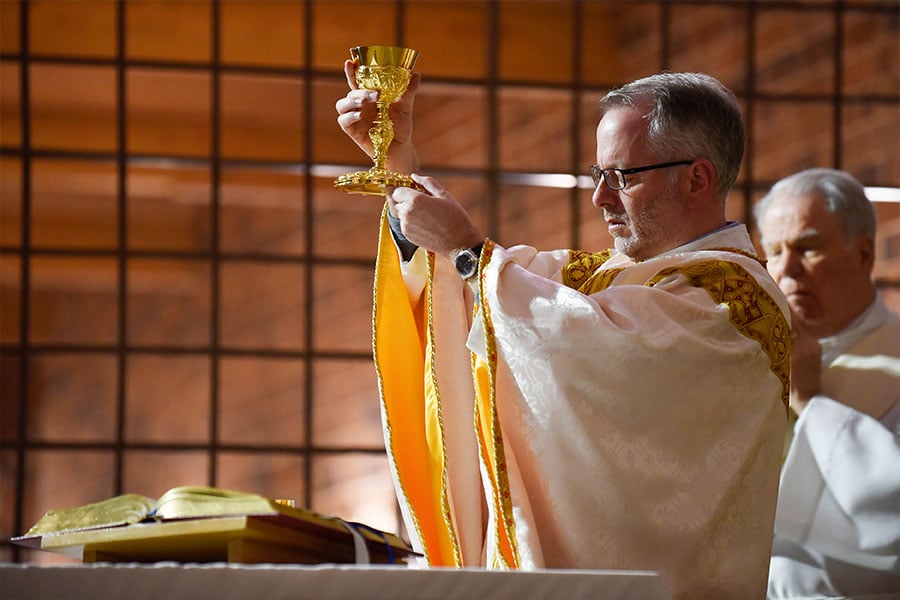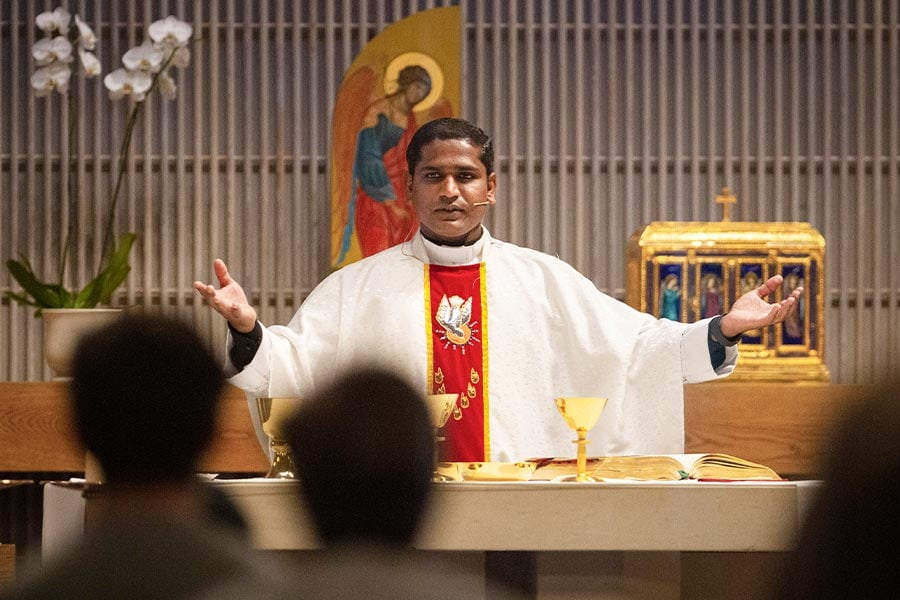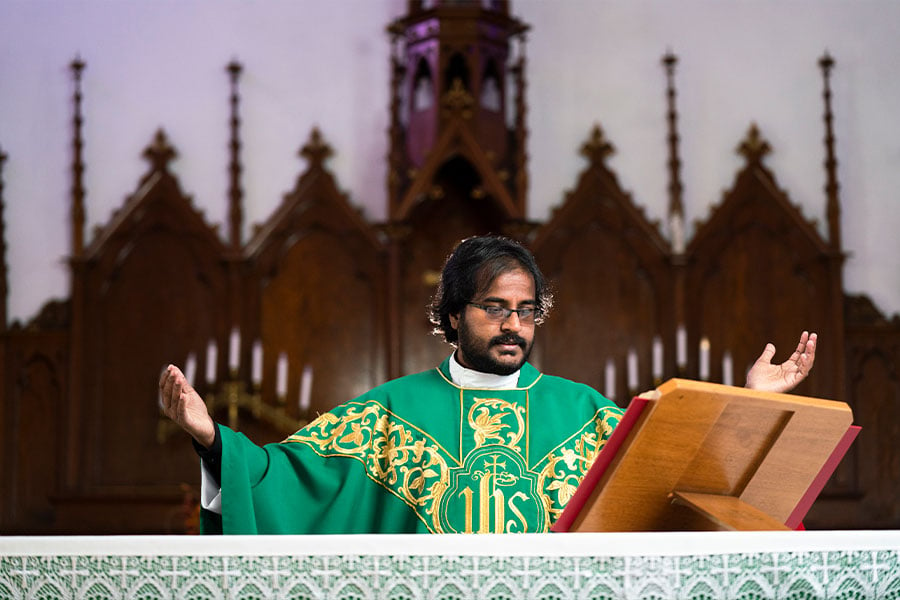All together: Pallottine priests in the Diocese of Fort Worth

Father Prakash Dias, SAC, elevates the Body and Blood of Christ at Sacred Heart of Jesus Parish in Breckenridge. (NTC/Juan Guajardo)
Symbolically, you might say that Society of Catholic Apostolate priests, better known as Pallottines, are part of the very DNA of Christ’s Church in the Diocese of Fort Worth. Sixteen years before the Diocese of Fort Worth was established, the Pallottines were hard at work ministering at parishes, establishing missions, and bringing the faithful back into the fold of the Catholic Church in North Texas.
St. Stephen Parish in Weatherford was among the first in the present Diocese of Fort Worth to benefit from the presence of the Pallottines, when in 1953 two Irish Pallottine priests, Father James Maher and Father Alphonsus Hayes, were assigned by Diocese of Dallas-Fort Worth Bishop Joseph Lynch to take over pastoral duties. The arrangement speaks volumes of the esteem in which Bishop Lynch held the religious group. The parish maintained a special place in the bishop’s heart, as he had actually built St. Stephen’s red brick church in 1902 when he was assigned there as a young priest. He knew the Pallottines would serve parishioners well.
Historical accounts in a St. Stephen booklet entitled “The First Hundred Years” bear out the fact that the Pallottines’ mission for engaging the laity was effective. Author Billie Greenlee wrote nearly 40 years ago, “No sooner had Father Maher and Father Hayes reached Weatherford than things began to happen. Church attendance increased immediately.”
The success of the Pallottines in building the Church in the Weatherford area prompted Diocese of Dallas-Fort Worth Bishop Thomas Gorman to seek the help of the religious society to staff churches and develop faith communities during the years he shepherded the North Texas flock of Catholics from 1954 to 1969. That tradition continued as the Diocese of Fort Worth was created in 1969, with Pallottines continuing to serve at several area parishes and in special diocesan ministries today.
At St. Stephen, the long line of Pallottine priests serving the parish has remained unbroken for 67 years. Current SAC priests include Father Michael O’Sullivan and Father Emmet O’Hara. Like their predecessors at the parish, Pastor O’Sullivan and Parochial Vicar O’Hara are with the Mother of Divine Love Province in Dublin, Ireland.
“The older Pallottines left a good legacy for us,” Fr. O’Sullivan said. “We’re standing on the shoulders of giants.”
The priest continued, “Our mission has always been to build up the lay apostolate and give people confidence to know that they all have a vocation.”

Father Emmet O'Hara (NTC/Ben Torres)
Fr. O’Hara shares that Pallottine charism to engage the laity. “We give people the confidence to live out their own vocation,” the parochial vicar said. “They have the gifts and those gifts really just need to be brought out.”
No matter where Pallottines call home, they all share the mission to make the faithful an integral part of the Church. SAC missionary priests from the Assumption of the Blessed Virgin Mary Province in India began arriving in the Diocese of Fort Worth 15 years ago. Among the first to serve the diocese was Father Balaji Boyalla, who has been taking on pastoral care of area parishes since 2008.
“Whether we are Irish, African, Indian, European, or American, we all have one charism,” Fr. Boyalla said of the society founded by St. Vincent Pallotti. “We have one saint, one charism, and one goal.”
Now pastor of St. Michael Parish in Bedford, Fr. Boyalla said he joined the Pallottine family of apostolates because he wanted to be a missionary and an apostle for Christ. “Even the Apostles were missionaries,” Fr. Boyalla said, explaining that St. Thomas, one of the 12 Apostles of Christ, traveled to India and brought Christianity there.
As a Pallottine, Fr. Boyalla and his community follow St. Vincent Pallotti’s mission “to promote the Gospel of Jesus Christ, to call the clergy, religious, and laity to work as partners, to renew the faith, and rekindle love.”
Fr. Boyalla explained that the number of Pallottines in India is growing, requiring a restructuring of the Assumption of the Blessed Virgin Mary Province. From this province, Our Lady of Good Health Province and Gloria Dei Region, both in India, were formed. Seven Indian priests from the two provinces and the region are serving in the Diocese of Fort Worth. Fr. Boyalla is now associated with the Gloria Dei Region.
Also among the Pallottines from India is Father Mariya James Susai Manickam, from Our Lady of Good Health Province in India. He now serves as parochial vicar at St. Michael. Fr. Manickam said that St. Vincent Pallotti’s teachings have greatly enriched the Church.
“Without the involvement of all the people,” Fr. Manickam said, “the Church is only clergy.
“St. Vincent Pallotti taught us that this is a ministry of Christ,” Fr. Manickam continued, “and each person has an equal responsibility. He did not make a distinction. He meant everybody — priests, religious, lay people — all joined together.”
Father Prakash Dias, pastor of Sacred Heart of Jesus Parish in Breckenridge and Jesus of Nazareth Parish in Albany, is a Pallottine who takes a practical approach to involving laity in building the Church. He is from the Assumption of the Blessed Virgin Mary Province in India.

Father Mariya James Susai Manickam (NTC/Ben Torres)
“I try to recognize people’s talents and put them to good use,” Fr. Dias said. “Recently, at Sunday Mass, I asked people with different skills to please sign up and be of service to the Church — whether it be as a carpenter, a welder, a plumber, a computer technician, a teacher, or with whatever special talents they have.
“I know we have parishioners who can contribute in many ways to help the Church and our community.
“This was precisely the desire of our founder, St. Vincent Pallotti, to have a participatory Church,” said Fr. Dias.
Father Vijaya Raju Mareedu, a Pallottine priest from the Gloria Dei Region in India, covers a lot of territory for the Diocese of Fort Worth. He serves as parochial administrator of St. Rita Parish in Ranger, Our Lady of the Holy Rosary Parish in Cisco, St. Francis Xavier Parish in Eastland, and St. John Parish in Strawn.
Ordained in 2015 and arriving in the United States in 2018, the young priest reflects the optimism and charism of St. Vincent Pallotti and those who follow the society he established 185 years ago.
“I am happy to be here,” Fr. Mareedu said, adding that in harmony with his parishioners, “I look forward to many years of growing closer to Christ, together.”

Father Vijaya Raju Mareedu (NTC/Juan Guajardo)
The young Pallottine also made a point, like many of the other priests of his order who spoke with the North Texas Catholic, to bring a painting named “Mary Queen of Apostles” into focus.
St. Vincent Pallotti commissioned the painting, which shows Mary together with two other women and the Apostles as the Holy Spirit descends upon them.
Acts 1: 13-14 describes it this way:
“When they entered the city they went to the upper room where they were staying, Peter and John and James and Andrew, Philip and Thomas, Bartholomew and Matthew, James son of Alphaeus, Simon the Zealot, and Judas son of James. All these devoted themselves with one accord to prayer, together with some women, and Mary the mother of Jesus, and his brothers.”
For Fr. Mareedu and his fellow Pallottines, the image and the Scripture reinforce their founder’s mission to emphasize that the Church comprises all people — clergy and laity alike.
“These timid men and women who came together in the upper room went out with Spirit-filled hearts to spread the message of Christ,” Fr. Mareedu said. “That is the same Holy Spirit that should touch each one of us to be led by Him and Him alone.”
